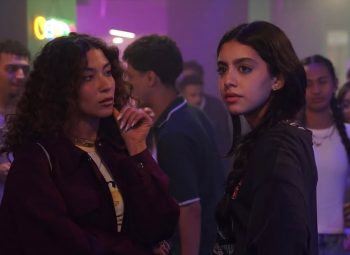If you’re a Netflix fanatic, then you probably heard of the first Arabic Netflix Original that was dropped last week, Jinn. The Jordanian supernatural teen drama has garnered a massive amount of mixed emotions, including a brutal backlash.
Some viewers saw that the series does not reflect the conservative Jordanian society whatsoever. This opinion was a result of two kissing scenes and the overall language used throughout the dialogue; which were both perceived as immoral. However, Netflix MENA, the Jordanian Royal Film Commission, and even Prince Ali bin Al Hussein responded, and they all had a different say in that.
Luckily enough, we were invited to attend Jinn’s launch event in Amman, and got to sit down with the series’ cast and crew. We had a brief, yet interesting talk about the show and their roles, but what we were most concerned with was how Jinn is expected to change western perception of the Middle East.
“When you watch Hollywood movies that talk about the Middle East, you always get the same picture. It’s the pyramids in Egypt, a tent and a camel, and a guy on a chair smoking or doing whatever”, Hamzeh Okab, who plays Keras, told us. “Honestly, when I see that, I get really annoyed because that might have been the case years ago, but I swear to God we’ve changed. We’ve modernised in many ways,” he continued.
Media, and films in particular, are to blame when it comes to cultural stereotyping, and unfortunately, the Arab world has fallen victim to that. Having heard that a production giant like Netflix is to start investing in the region has definitely raised our hopes high.
“I think the Middle East has never been seen in this light before. I also think it’s very interesting to show how ‘some’ people live in Jordan and how their habits are not that different from people all around the world,” Aysha Shahaltough, known as Vera on the show, said.
When we asked director Mir-Jean Bou Chaaya, he told us that he hopes that Jinn becomes what they created it to be in the first place, a solid bridge to the Arab world. “We created this show to be a solid bridge to the Arab world that gets you straight in with no stereotypes, no unnecessary censorship, and straight to the heart of how these teenagers are living. But of course, with a story and a twist, and all the fun elements,” he explained.
It’s not just that, but the people behind Jinn also wanted to make the show relatable to everyone and discuss worldwide problems. For instance, one of the main characters, Yassine, played by Sultan Alkhail, was bullied at school and home. That alone was a major cornerstone in the plot which has led to some main events.
“At the end, the story has supernatural elements, but it’s a coming of age story and people can relate to our characters,” Alkhail said. “People getting bullied, it doesn’t happen only in Jordan or the Middle East, it’s everywhere.”
Salma Malhas, who plays rebellious Mira, also raised a very important concern that she personally has been through. As she grew up, she found it hard to give an example of a female Arab figure she could identify with. For a Jordanian child who dreamed of growing up and become an actress, all her role models were from the US and the UK. “What we’re doing here is so important because it’s important for someone younger to see someone she can identify with on screen,” Salma told us.
Aysha also agreed, saying, “It’s so nice now that people from our age and younger can aspire to be actors and filmmakers, because these things are possible and it’s available, and it can help you reach the world." Sultan then added, "It’s giving us the chance to have Arab voices in entertainment.”
Thankfully, Netflix is contributing to getting such Arab voices heard, and Jinn is only the beginning. Set to be the second Arabic Netflix Original, Al Rawabi School for Girls will feature an all-female cast and crew. Smashing some gender stereotypes about the region makes it quite something to look forward to. Additionally, it was announced last month that late novelist Ahmed Khaled Tawfik’s Paranormal is going to be the third Arab production by Netflix. The horror series is a collaboration between filmmaker Amr Salama and producer Mohamed Hefzy.
Such productions do not just break stereotypes and change the western perception of our region, but also contribute to many more important matters. One of which is film-induced tourism. Jinn, for instance, is set in the ancient city of Petra, one of the seven wonders of the world. Has anyone thought how high international viewership of the show can give tourism in the region a boost?
“This is the first time to actually have a show with teenagers representing local characters shown in 190 countries, with almost 150 million subscribers. Even with movies, you don’t have the same reach that you have with Netflix, that’s dubbed in so many languages and subtitled in 120 languages,” co-director Amin Matalqa told us. “The potential for widespread viral exposure to one show in such an instant, this is the ultimate example. It’s as good as it gets,” he continued.
Add to that, it’s an excellent opportunity to showcase local and regional talents and expose them to the world. Be it Jinn, or any other Arab production, they will show the world that there is a pool of talented filmmakers and actors here, proving that we really can compete with global standards.
___________________
By Nadine Arab







